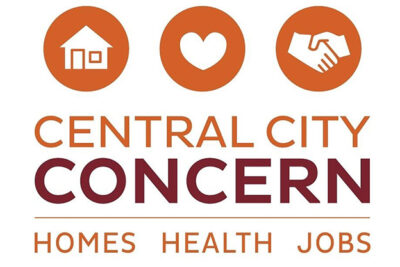Provided by Laura J. Recko, Associate Director of Communications & Donor Relations, Central City Concern
 Central City Concern’s roots trace back to 1979, when Portland was seeking solutions to help people on the street who were incapacitated by alcohol use disorder. The agency (originally called Burnside Consortium) was charged with funding local recovery treatment providers and preserving Old Town’s housing stock. Central City Concern (CCC) channeled federal funds to social service agencies and listened to the residents of Old Town’s hotels to identify their needs and develop a sense of community. Within a year, CCC pioneered an integrated system of compassionate care in Old Town that would become a model for the country.
Central City Concern’s roots trace back to 1979, when Portland was seeking solutions to help people on the street who were incapacitated by alcohol use disorder. The agency (originally called Burnside Consortium) was charged with funding local recovery treatment providers and preserving Old Town’s housing stock. Central City Concern (CCC) channeled federal funds to social service agencies and listened to the residents of Old Town’s hotels to identify their needs and develop a sense of community. Within a year, CCC pioneered an integrated system of compassionate care in Old Town that would become a model for the country.
 Early on, it was clear that safe housing was paramount for those in recovery and to the neighborhood at large. Central City Concern adopted a strategy of purchasing and renovating historic buildings to ensure safe, well-maintained units and protect residents from rising rental costs. CCC’s work in renovating and managing urban single-room occupancy housing set the standard for other nonprofit housing organizations and attracted national attention.
Early on, it was clear that safe housing was paramount for those in recovery and to the neighborhood at large. Central City Concern adopted a strategy of purchasing and renovating historic buildings to ensure safe, well-maintained units and protect residents from rising rental costs. CCC’s work in renovating and managing urban single-room occupancy housing set the standard for other nonprofit housing organizations and attracted national attention.
In 1982, CCC assumed management of the Hooper Detoxification Stabilization Center and quickly integrated innovative practices such as acupuncture, primary health care, and alcohol- and drug-free community housing. CCC’s continuum of care began to materialize at scattered sites throughout Old Town. in 2001, CCC assumed management of the Old Town Clinic, which had provided health care to Portland’s homeless population since 1983. The clinic completed CCC’s treatment continuum, proving that someone with a safe place to sleep, positive peer relationships, employment assistance and quality physical and mental health care had a better chance to beat their addiction and transform their life.
 CCC continued listening, responding to and drawing on the experience and knowledge of underserved communities to address barriers to care. In 2005, CCC started Puentes, a recovery program for the Latinx community led by bilingual and bicultural individuals and grounded in shared Latinx values. In 2015, the Imani Center opened to provide mental health and addiction treatment services and build a community of support for African Americans who may face barriers to mainstream treatment.
CCC continued listening, responding to and drawing on the experience and knowledge of underserved communities to address barriers to care. In 2005, CCC started Puentes, a recovery program for the Latinx community led by bilingual and bicultural individuals and grounded in shared Latinx values. In 2015, the Imani Center opened to provide mental health and addiction treatment services and build a community of support for African Americans who may face barriers to mainstream treatment.
When CCC opened the Old Town Recovery Center next to Old Town Clinic in 2011, CCC became better able to address the chronic, severe mental and behavioral health issues that confront many of their clients. The programs’ shared proximity meant clients could receive integrated primary care, pharmacy services, recovery support, counseling and more in one place.
In 2019, CCC’s vision of wraparound services culminated in the opening of Blackburn Center in East Portland. The center brings integrated primary care services, mental health and addiction treatment, pharmacy services, employment assistance, housing, and comprehensive case management together under one roof. Learn more detail and see photos of CCC’s history.
Long known as an Old Town-based organization, CCC is strategically expanding their footprint to serve people facing homelessness throughout the Portland metro area. CCC also strives to correct deficiencies in previous recovery models and historic discrimination against Black, Indigenous, and people of color in Portland by expanding culturally specific programs and actively working to become an anti-racist organization. Learn more about CCC’s racial equity work.
COVID-19 Response
Since the early days of the pandemic, CCC knew some of their housing facilities were at high risk for infection outbreaks. Drawing on community resources and donations, CCC implemented universal precautions and vigorous cleaning standards, distributed personal protective equipment and opened mobile testing sites.
Every housing building had a dedicated phone line for residents to call for screening if they started exhibiting symptoms. CCC tracked and quarantined residents with concerning symptoms, exposures and positive COVID tests. With the help of community partners, CCC assembled mobile testing clinics for residents of all ages, from babies to the elderly. Between March and December 2020, Central City Concern’s housing and residential sites had only 50 positive cases out of over 4,800 residents and clients tested.
The COVID-19 pandemic triggered a surge in substance use, relapse and overdose, as well as challenges for those in recovery. CCC’s medical providers and recovery staff responded with creativity and innovation, providing uninterrupted care and access to treatment. In addition to providing cell phones to many of their most vulnerable clients, CCC partnered with Enli Health to develop free-standing soundproof booths equipped with laptops. Read more about how CCC implemented telehealth services.
As CCC looks to the future, it will continue responding to the needs of neighbors with caring, innovative services that address the whole person and elevate the entire community.

